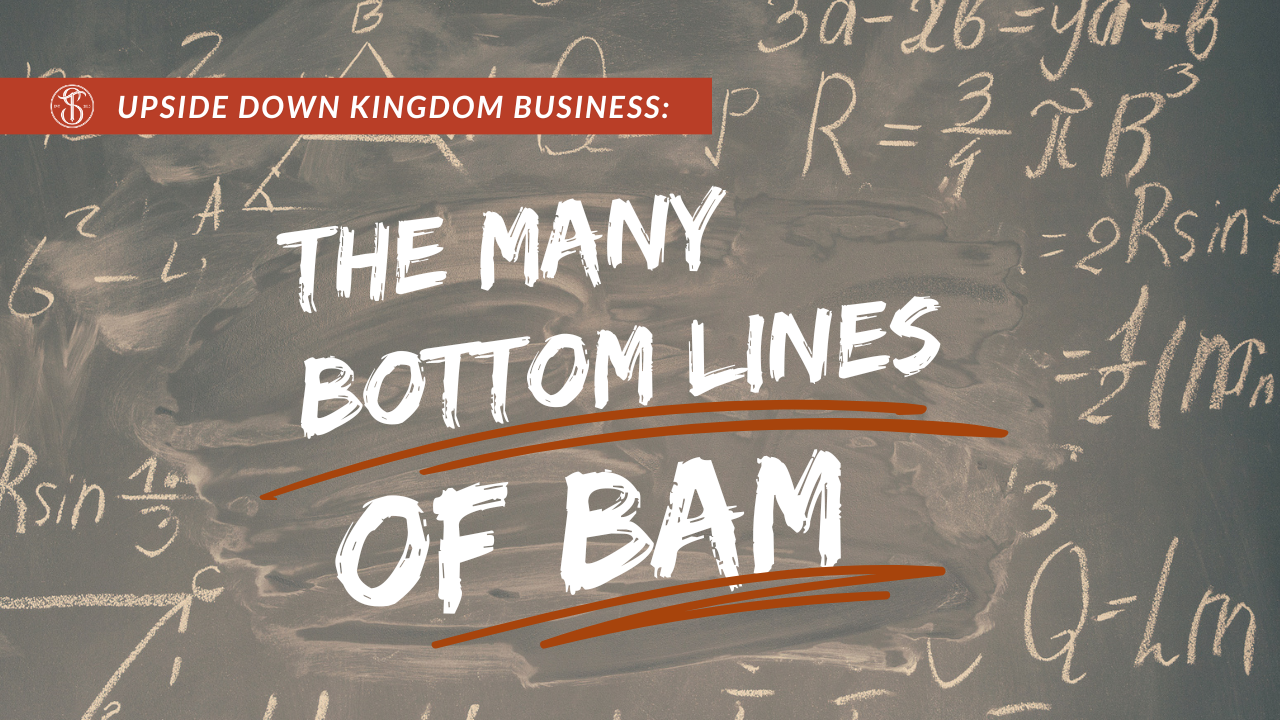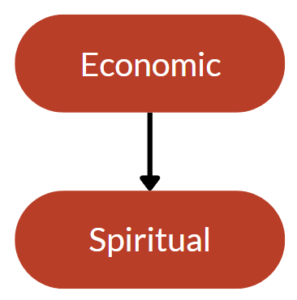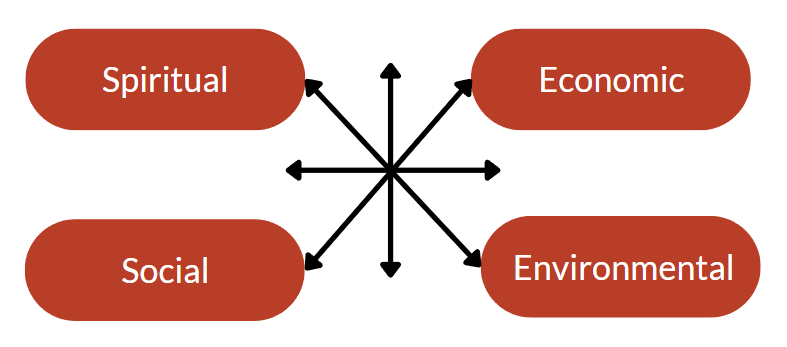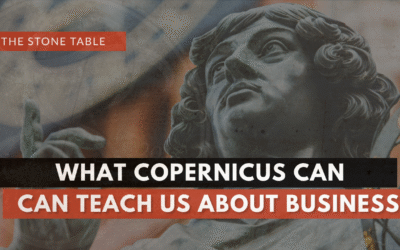Upside-Down Kingdom Business: The Many Bottom Lines of BAM

“There is only one bottom line for the Christian. The spiritual bottom line.”
I was recently at a missional business conference and a brother challenged the table with this line. I wholeheartedly agreed! Or… at least, I wanted to agree.
By “spiritual,” the brother was referring specifically to the work of evangelism and discipleship being our primary goal. Not profitability. Not social justice issues. Not caring for the environment. All four of these are what Mats Tunehag, BAM Global Chairman, calls the “Quadruple Bottom Line.”
There was a part of me that couldn’t agree more with the brother. And yet, there was something about the exclusion of all the other bottom lines that didn’t sit well with me.
Evangelism and discipleship are clearly important. That’s what missions is all about! We must proclaim the gospel and make disciples (Romans 10:14, and Matthew 28:19).
So why was the single bottom line so bothersome?
I wondered.
Caring for creation.
Social justice.
Profitable, sustainable business.
Weren’t these also biblical?
But of course, all these issues pale in comparison to evangelism, to reconciliation to Christ and eternal life with Him. Right?
BAM Viewpoints
There are several views on how many bottom lines we should have in Business as Mission, and the majority of BAM practitioners adhere to one of the following viewpoints. As with the brother above, there are some who focus exclusively on the spiritual bottom line. There are others who emphasize profitability as well, pointing to the interdependence they have on one another. And finally there are many who subscribe to the quadruple bottom line, arguing that there is simply no exclusion from what is important to God.
The Spiritual Bottom Line
My guess is that as you read the words “spiritual only” you will either feel that this is obviously the best model or that it is obviously the worst model. Please hear me when I say that there is much to appreciate about both points of view.
On the one hand, most believers agree that there is a certain primacy to evangelism. If you are faced with a choice between giving money to a poor person or leading them to eternal life through Christ, surely we must all agree that the latter is more important.
On the other hand, however, we know that the demonstration of our love through works is often a partner or precursor to salvation just as much as it is an outflow of salvation. We discussed this in depth in the last article of this series.
Just take a look at Acts 3:6.
“Then Peter said, “Silver or gold I do not have…”
Great! So he ignored the lame beggar’s needs and told him he needs Jesus, right?
NO!
“…but what I do have I give you. In the name of Jesus Christ of Nazareth, walk.”
He gets right into the thick of this guy’s physical needs and meets him where he is.
What happens next? The man goes “walking, and jumping, and praising God” (v7), and this opens the door for the preaching of the gospel (v12).
In the last article, we showed how Business as Mission teams that saw their purpose as primarily to bless far outperformed in converting people to Christ than those who focused solely on conversions.
But there is also, for the “spiritual only” adherents, the question of profitability. Is it even necessary to waste time on building a profitable business? The argument is that every minute spent on building the business is a minute not spent in sharing the gospel.
I typically hear this argument from those in the hardest business environments. While there are many unreached people groups in more developed countries, a vast majority of them are in underdeveloped areas of the world. That means that many BAMs are in economic ecosystems that are known to be challenging, and getting the business to profitability is very hard!
“Profit as a bottom line?!”
Some would rather throw up their hands and just ask for donations to keep the visa vehicle afloat, and I don’t blame them. If you’re there to win souls for Christ, business can often feel like a necessary evil to the greater work.
And yet, that is sacred/secular thinking.
Christ has reconciled “all things to himself” (Colossians 1:19–20), and, as Erik likes to add, “including the work of our hands.”
But profitability also has another important function. Developing profitable, sustainable businesses actually results in a greater witness and more souls saved. As discussed in the previous article, the more we are able to bless our community, the more opportunity we actually have for witnessing.
In this way, you might even say that the “spiritual only” model is actually trying to do BAM in reverse. It’s like doing Maslow’s hierarchy backwards. Maslow’s is about meeting our base needs for survival first before we ever consider things like spirituality and self-actualization. In the same way, for those doing business in wealthy countries, profitability is easier. As a result, they are far more inclined to consider the social and environmental needs of the community as they look for ways to engage in spiritual conversations.

Yet, in less developed countries, environmental issues such as clean water and air, and social issues such as carrying of justice, homelessness, and healthcare are often vastly underserved.
In this case, Maslow’s hierarchy is oddly reversed in the mind of the practitioner. The missionary, seeing that the need is great, presses on to the most important goal. There are far too many needs, they suppose, and one justice issue would take more than their lifetime to address. So they focus in on the spiritual needs of the community.
On the contrary, however, it is in these hard environments that people need the body of Christ to address their physical and immediate needs most, just as Jesus did.


As the African proverb goes, “an empty belly has no ears.”
Double Bottom Line
As we see with those who subscribe to the “spiritual only” model, difficult business climates often result in entrepreneurs that give up on nailing the business model altogether. I believe it is a critique of the former model that has landed so many in the double bottom line category. They agree that evangelism takes primacy, but they also understand that evangelism can’t happen, or won’t happen effectively, if they don’t get the business model to a sustainable position.

A further critique of the spiritual only model is that it appears to many that these practitioners are actually job “faking.” Neither the host country nor the local community is interested in fake businesses that aren’t adding value to the local economy through taxes, jobs, products, and services. We must engage in real business that provides real value to the community.
So the objective is to affirm the need to get the model right. Spending time on your business is not wasted time! Every minute you spend working on the business adds value to people around you, furthers your relationships including trust and transparency with the community, and deepens the witness of the gospel.
In short, I believe that this model is admirable. One of the organizations that famously subscribes to it is OPEN USA, founded by Patrick Lai.
Many who subscribe to the double bottom line model would say that “environmental” and “social” bottom lines are not absent from this structure. Rather they are assumed and absorbed in the other two.
While this is well and good, in practice what we see is that they are often forgotten. In the absence of stating these objectives, the practitioner jumps over the lower-Maslow’s hurdles of social and environmental needs in the community and races toward accomplishing the spiritual and profitability goals.
It is true that the double bottom line could be seen to incorporate all these values, but that is as true as saying that a focus on evangelism necessarily includes love of our neighbor, and vice versa. The unfortunate truth is that there are many who evangelize without love, and there are many who attempt to love without leading the lost to Him who is Love.
As a final note, as we have observed with Maslow’s hierarchy of needs, I think it may be more fitting to consider the double bottom line as a stacked model, rather than side-by-side bottom lines. These two are clearly not equals. Yet, it is business sustainability that grows our capacity for spiritual impact.

Getting the model right and growing its impact should not be understated. The jobs, relationships, reputation, influence, access, taxes, blessing, etc. These are all the outflows of a business person who strives to steward their resources and time well and lay a firm foundation, knowing that in the long-term, they will reap a spiritual harvest from the seeds that they sow into their business and their community.
Triple Bottom Line (CSR)
I’m sure that there will be a few who will read this article and think, “Great, so you’re basically just talking about corporate social responsibility, but from a Christian perspective.”
Even the corporate, secular world has developed from a single, profitability bottom line to a triple bottom line, adding to profits the social and environmental impact of the business. We call this corporate social responsibility (CSR).

Yet, most would say that CSR actually reinforces Milton Friedman’s shareholder theory, discussed previously!
The argument is of course that they should care about the environment and social issues because otherwise people will stop buying from them. And so, in this way, CSR is, for many corporations, simply a means to furthering the Friedman doctrine.
There are those who would like to point out that corporations like Apple and Amazon are making incredible leaps and bounds in corporate social responsibility. And yet we forget that CSR is still primarily a PR stunt for corporations who see the painful investment as a means to the Friedman end, to “increase shareholder returns.”
So we end up with hidden abuses conveniently detached from their brand. Just take a look at the latest reporting on Foxconn regarding forced labor, sexual harassment, and gruling child labor, who’s primary customers include Apple (responsible for 50% of their sales), Amazon, Microsoft, HP, Intel, Dell, and Sony. And there are plenty of other abusive suppliers for companies like Amazon, that are conveniently dissociated from their brand name.
As Jeff Van Duzer argues, when employees have the profit-first mission in front of them, the result is short-sighted goals that exploit and abuse rather than empower for generations to come.
Kingdom business is not just a Christian twist on CSR.
Quadruple Bottom Line
The predominant position in the greater BAM community, including BAM Global, Lausanne, and others, is that there are four bottom lines. This is termed the “quadruple bottom line,” and it includes social, economic, spiritual, and environmental measures. Mats Tunehag has occasionally called it CSR+.
The argument is that a business that does not consider the environment or the poor, orphan, widow, foreigner, etc. (Isaiah 1:17, Deut. 24:17-22, Micah 6:8, etc.) is not a biblical business and therefore not a good reflection of the gospel. We cannot call that good.
Further, a business that does not consider sustainability and good stewardship of resources is not God honoring (Matthew 25:14–30 and 1 Peter 4:10). We discuss a right posturing of profitability in the first article of this series.
We have already discussed Maslow’s Hierarchy, and the last article goes into social responsibility in depth, but I want to add an additional layer.
Jordan Raynor says that the Bible has two clear callings:
“The original calling—to rule over the earth. To make culture. And a new calling—to make disciples….The new calling to make disciples does not negate or cancel out the original calling.”
When Jesus commands us to go and make disciples (Matthew 28:19 / Great Commission), we had better take that seriously! And yet, we must not forget everything else that God has commanded as well, to “fill the earth and subdue it” (Genesis 1:28), to have dominion over the sea and the air and living things, to “do justice” (Micah 6:8), to love God and “love our neighbor as yourself” (Matthew 22:39), and so on.
Time and time again God shows that he cares deeply about all creation. For 70 years the Israelites were in captivity while the land rested from the missed sabbath years. And in Job we understand that the land would “cry out” against him if he did not properly care for it (Job 31:38-40).
So we see that they all work together.

We should in no way demean or reduce the call of all to spread the gospel. That calling is clear, and it is for all. So is the call to fill the earth and subdue it. So is the call to do justice. So is the call to love. And they all work together.
Missio Dei
I want to end the discussion of bottom lines with one final dimension. Missiologists often discuss the missio dei, a Latin phrase meaning “mission of God.”
I started this article with a brother’s comment about how the spiritual should always be the bottom line for the Christian, and I mean to agree with that.
While it seems beneficial to make note of the other bottom lines so as not to neglect them or fail to consult God about them, I want to add that God’s will is always the bottom line.
If one brother feels that God is directing him to neglect his business for a time to focus on discipleship and another feels clearly that he is to do the opposite, are either of them wrong?
I think 1 Samuel 15:22 sums this up well:
“Obedience is better than sacrifice.”
And so I will leave you with the following structure:

For everything is from God, all is through God, and ultimately it must be to God.
We have one bottom line, the mission of God in the world, and may we keep these four guardrails in front of us, being careful to observe all of God’s commands (Deut 17:19).
For,
“There is not a square inch in the whole domain of our human existence over which Christ, who is Sovereign over all, does not cry, Mine!” – Abraham Kuyper



